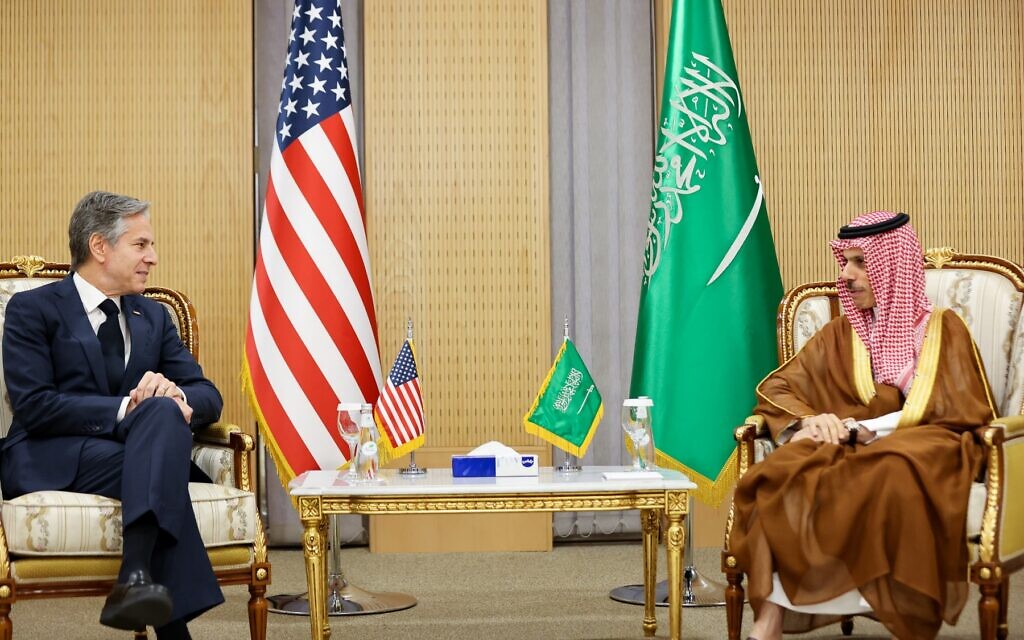Saudi Arabia would be willing to boost oil production next year in a move aimed at earning goodwill with Congress toward a normalization agreement with Israel that would include a key mutual defense pact and weapons deal with Washington, the Wall Street Journal reported on Friday.
According to the report, which cited Saudi and US officials, Riyadh has told the White House it would be willing to increase oil production if crude prices are high to help secure the deal.
Washington has been working for months to broker a normalization deal between Israel and Saudi Arabia that would mark a historic breakthrough in the Middle East and a diplomatic feat in an election year for US President Joe Biden, whose administration has been pushing the potential agreement. A number of senior Biden administration officials have traveled to Riyadh over the past year to advance talks.
Saudi Arabia, home to Islam’s holiest sites, has never recognized Israel and has long insisted it would not do so without a just resolution to the Israeli-Palestinian conflict. Riyadh did not join the US-brokered Abraham Accords, which saw its Gulf neighbors Bahrain and the United Arab Emirates, as well as Morocco, establish formal ties with Israel in 2020.
In addition to the defense pact with the US and the arms sales, Riyadh has also demanded US cooperation on a civilian nuclear program on Saudi soil, as well as Israeli concessions to the Palestinians to secure the normalization deal.
Saudi Arabia’s offer to boost oil production if market conditions are favorable marks a departure from last year when it rebuffed a US request to help lower oil prices by upping production, and tame inflation amid high market volatility following the Russian invasion of Ukraine in 2022, which has upended economies worldwide.
Last October, Riyadh, Moscow and other top oil producers decided on a deep cut in production to boost crude prices, a move denounced by the US as a concession to Russia that would hurt the global economy. In June, Riyadh announced a fresh oil output cut following a meeting of major producers aiming to prop up prices despite fears of a recession.
These decisions by the Saudi-led Organization of the Petroleum Exporting Countries, better known as OPEC, and the wider array of aligned oil producers led by Russia and known as OPEC+, have pushed prices higher.
OPEC+ countries produce about 60 percent of the world’s oil. The next meeting of the group is scheduled for November 26.
In its report Friday, the WSJ said that Saudi negotiators emphasized to the US that “market conditions would guide any action on production.”
Officials familiar with the ongoing normalization talks said the discussions “didn’t represent a long-term agreement to cut prices,” according to the report.
Last week, the White House said Israel and Saudi Arabia were moving toward the outline of a historic US-brokered deal to normalize relations.
“All sides have hammered out, I think, a basic framework for what, you know, what we might be able to drive at,” National Security Council spokesman John Kirby told reporters. “But, as in any complex arrangement, as this will inevitably be, everybody is going to have to do something. And everybody is going to have to compromise on some things,” Kirby said.
In an address to the United Nations General Assembly on September 22, Prime Minister Benjamin Netanyahu said Israel was “at the cusp” of a transformative peace agreement with Saudi Arabia.
The Palestinians remain a sticking point in the negotiations. The Biden administration has pushed Israel to make concessions to the Palestinians as part of a potential deal, but Netanyahu is constrained by his far-right coalition partners, who oppose steps toward Palestinian statehood.
The Palestinian Authority has presented a list of potential steps it would like to see taken in the context of the normalization talks with Washington and Riyadh.






